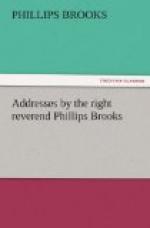Thus I have tried briefly to trace out the gradual course by which God brought the character which He designed to be the controlling character of this new world into distinct collision with the hostile character which it was to destroy and absorb, and set it in the person of its type-man in the seat of highest power. The character formed under the discipline of Freedom and the character formed under the discipline of Slavery developed all their difference and met in hostile conflict when this war began. Notice, it was not only in what he did and was towards the slave, it was in all he did and was everywhere that we accept Mr. Lincoln’s character as the true result of our free life and institutions. Nowhere else could have come forth that genuine love of the people, which in him no one could suspect of being either the cheap flattery of the demagogue or the abstract philanthropy of the philosopher, which made our President, while he lived, the centre of a great household land, and when he died so cruelly, made every humblest household thrill with a sense of personal bereavement which the death of rulers is not apt to bring. Nowhere else than out of the life of freedom could have come that personal unselfishness and generosity which made so gracious a part of this good man’s character. How many soldiers feel yet the pressure of a strong hand that clasped theirs once as they lay sick and weak in the dreary hospital! How many ears will never lose the thrill of some kind word he spoke—he who could speak so kindly to promise a kindness that always matched his word! How often he surprised the land with a clemency which made even those who questioned his policy love him the more for what they called his weakness,—seeing how the man in whom God had most embodied the discipline of Freedom not only could not be a slave, but could not be a tyrant! In the heartiness of his mirth and his enjoyment of simple joys; in the directness and shrewdness of perception which constituted his wit; in the untired, undiscouraged faith in human nature which he always kept; and perhaps above all in the plainness and quiet, unostentatious earnestness and independence of his religious life, in his humble love and trust of God—in all, it was a character such as only Freedom knows how to make.
Now it was in this character, rather than in any mere political position, that the fitness of Mr. Lincoln to stand forth in the struggle of the two American natures really lay. We are told that he did not come to the Presidential chair pledged to the abolition of Slavery. When will we learn that with all true men it is not what they intend to do, but it is what the qualities of their natures bind them to do, that determines their career! The President came to his power full of the blood, strong in the strength of Freedom. He came there free, and hating slavery. He came there, leaving on record words like these spoken three years before and never contradicted.




